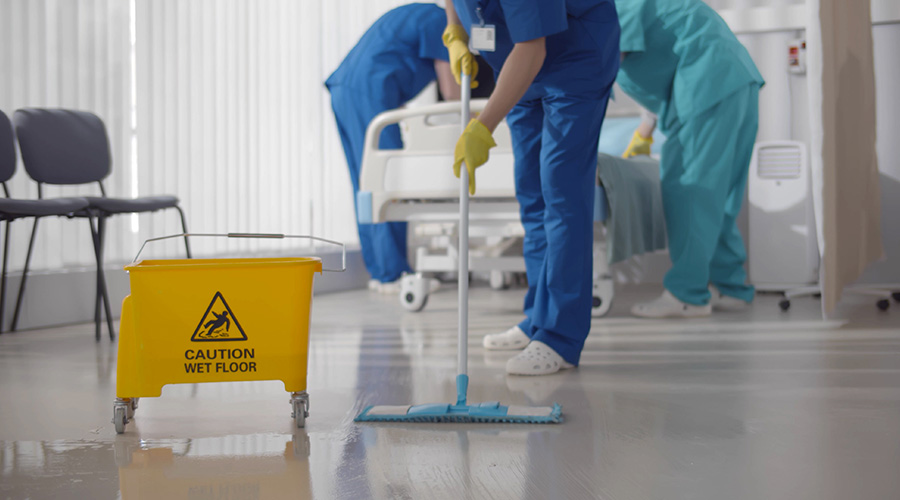Concerned about mounting exposure to toxic chemicals in everyday life and the threat of drug-resistant bacteria, Kaiser Permanente has banned paint and other interior building products treated with "germ-fighting" antimicrobial agents for use in its hospitals and other buildings.
Manufacturers routinely add antimicrobial chemicals to products for added infection control, although the Centers for Disease Control and Prevention (CDC) has found no evidence to suggest the products offer any enhanced protection from the spread of bacteria and germs, and that proper cleaning and hand washing are the best ways to prevent infection.
The Guidelines for Environmental Infection Control in Health-Care Facilities, published in 2003 by the CDC and its Healthcare Infection Control Practice Advisory Committee, say no evidence is available to suggest that use of products treated with antimicrobial chemicals will make patients healthier or prevent disease.
Kaiser Permanente, the nation's largest integrated health care provider and not-for-profit health plan, has been steering builders and architects it works with away from these antimicrobial products since 2006. Recently, the organization formalized its opposition to finishes and fabrics containing antimicrobial chemicals and identified 15 specific antimicrobial chemicals to ban from its hospitals and other buildings because they can be toxic to both people and the environment.
"Health care interiors can be beautiful spaces designed to inspire health and healing," said John Kouletsis, vice president of facilities planning and design. "But lurking beneath the surface can be a surprising number of pollutants that are anything but benevolent."
Kaiser Permanente has a long history of working with manufacturers to remove harmful chemicals from the products it purchases and to develop greener and safer products that are now widely available to consumers.
"Our thought is that if there's a nonchemical way to solve a problem or there are greener products available that offer the same performance, we should pursue those as safer alternatives," Kouletsis said.
Kaiser Permanente consulted with infectious-disease experts before notifying furniture and fabric suppliers it would no longer buy products with the antimicrobial agents. The infection prevention community agreed with the CDC's 2003 findings that properly cleaning and disinfecting surfaces will kill pathogens effectively and prevent the risk of spreading hospital-associated infections. The risk is further reduced with appropriate hand washing by staff and patients.
The antimicrobial ban is effective immediately and applies only to new construction projects and renovations not yet in the purchasing phase. With thousands of projects underway at any given time — from minor remodels to major hospital construction — the decision to ban these products will have significant influence. Kaiser Permanente has 38 hospitals and more than 600 medical offices in the U.S.
Kaiser Permanente prohibited the use of furniture treated with toxic flame retardant chemicals in 2014, and four additional hospital systems quickly followed suit. Together their combined purchasing power amounted to roughly $50 million a year, a substantial enough sum to encourage manufacturers to make healthier products available to consumers.
Antimicrobials have found their way into every corner of the health care setting. They are now routinely added to paint and grout, ceramic tile, fabrics, glass, and even refrigerators and toilet seats. The products are marketed to health care consumers, as well as to gyms, daycare centers, senior-citizen residences and general consumers.
"Several years ago we stopped purchasing hand soaps that contain the antibacterial triclosan because it was found to be no more effective than washing with plain soap and water, and may cause hormone related health problems," said Kathy Gerwig, vice president of employee safety, health, and wellness, and Kaiser Permanente's environmental stewardship officer. "Removing antimicrobials from interior products is an extension of our longstanding efforts to create healthier environments for everyone."

 Building Sustainable Healthcare for an Aging Population
Building Sustainable Healthcare for an Aging Population Froedtert ThedaCare Announces Opening of ThedaCare Medical Center-Oshkosh
Froedtert ThedaCare Announces Opening of ThedaCare Medical Center-Oshkosh Touchmark Acquires The Hacienda at Georgetown Senior Living Facility
Touchmark Acquires The Hacienda at Georgetown Senior Living Facility Contaminants Under Foot: A Closer Look at Patient Room Floors
Contaminants Under Foot: A Closer Look at Patient Room Floors Power Outages Largely Driven by Extreme Weather Events
Power Outages Largely Driven by Extreme Weather Events